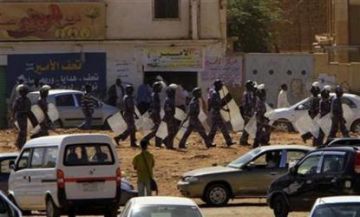Sudanese police clamp down on water cuts protestors
August 24, 2011 (KHARTOUM) – Water shortages on Wednesday sparked a new bout of protests in Sudan’s capital Khartoum, where the police forcibly dispersed the demonstrators and arrested some of them, eye witnesses told Sudan Tribune.

The authorities refrained from their customary violence in reaction to such protests and attempted to contain them peacefully.
This time, however, anti-riot police used teargas break up hundreds of demonstrators in Sudan’s twin capital city of Omdurman where some areas lacked water supply for days.
Eye-witnesses told Sudan Tribune that citizens in the areas of Al-Arda and Al-Abbasia in Omdurman on Wednesday staged massive demonstrations against the five-day absence of water in their areas. The protestors were chanting “we are thirsty in the land of two Niles.”
Subsequently, the police intervened and used teargas to disperse the protest, arresting 22 individuals in the process. All detainees were later released, however.
One demonstrator in Al-Arda area narrated to Sudan Tribune the way they suffer to secure potable water, saying they had to walk long distances to neighboring areas in order to find waters.
He added that they were motivated to demonstrate in order to draw the attention of state officials to their ordeal which reached unprecedented levels.
Ironically, Sudanese authorities recently announced plans to introduce prepaid water meters in houses of citizens as the country moves towards privatization of the national water corporation.
Meanwhile, in an effort to justify the water crisis, the water corporation in Khartoum said it “regrets” the water cuts and attributed them to the low production of the Mogran water treatment plant.
The water authority said in a statement published by Sudan Media Centers (SMC), a website run by the country’s security apparatus, that work was underway to address the shortages and bring the water supply back to normalcy.
(ST)
